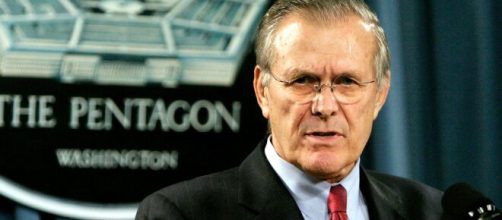The position of United States defense secretary is often a particularly difficult one, even by Cabinet standards. As a result, occupants of the office are often vulnerable to be left holding the proverbial bag for faults that weren't theirs. Such as with original Clinton Defense Secretary Les Aspin.
Whatever people's opinions of Donald Rumsfeld might be, the choices he made were generally his own. Good and bad alike. History is now left to sort out his legacy following his passing.
Died in Taos, New Mexico
Donald Rumsfeld has passed away from the blood cancer known as multiple myeloma.
His death came just days after former U.S. Senator Mike Gravel died of the same disease. Rumsfeld was in Taos in northern New Mexico. According to the BBC, he had a home there.
Rumsfeld's career in politics began as a staffer for Ohio U.S. Representative David S. Dennison Jr. Afterward, and he served on the staff of Michigan U.S. Representative Robert P. Griffin. Griffin was later elected to the United States Senate, where he eventually became the minority whip.
In 1962, Rumsfeld was elected to the United States House of Representatives in his own right. He represented the 13th District of Illinois and was re-elected three times. During his tenure in the House, he was a key figure in creating the Freedom of Information Act.
He also played an essential role in the rise of Michigan Congressman Gerald Ford to the post of House minority leader.
Ford's new position would put him on track to become U.S. vice president, as it would turn out. And, later, president. Along the way, Rumsfeld had left Congress and worked in many roles for President Richard Nixon. Then, shortly after taking office himself, Ford moved Rumsfeld to become his White House chief of staff.
The next year, Ford dismissed James R. Schlesinger as secretary of defense. And Donald Rumsfeld was appointed as his successor. As Ford's defense secretary, his duties included overseeing the development of the B-1 Lancer.
After Gerald Ford's time as president ended, Rumsfeld went into the private sector.
But before long, he began taking on political roles again. He also made brief moves for the 1988 and 1996 Republican presidential nominations.
He would be chosen as the first defense secretary for President George W. Bush. In his return, Rumsfeld quickly grew a rapport with the press covering him. However, things would take on a much more serious mood in the aftermath of 9/11. During which time, the War in Afghanistan was commenced.
The general public, by and large, understood the military action in Afghanistan. But the shift in attention to Iraq became a different story. A move that, as indicated by CNN, dominates his legacy. The decision was extremely polarizing from the start. And the quagmire that the situation turned into has had reverberating effects worldwide, with lives lost and devastating injuries sustained in the process.
Rumsfeld resigned as defense secretary in 2006. Bush appointed Texas A&M University President and former CIA Director Robert Gates to follow him. Gates would stay on into the Obama administration.
He was a high-ranking Navy officer
In his younger years, Donald Rumsfeld was an active member of the Boy Scouts of America. He eventually became an eagle scout. Later in life, he received the Distinguished Eagle Scout Award and the Silver Buffalo Award.
Rumsfeld would graduate from Princeton University with a bachelor's degree in politics. While at the university, he captained the varsity wrestling team and was a member of the NROTC.
He'd become an aviator in the United States Navy. Aircraft he piloted include the SNJ Texan, the T-28 Trojan, and the S-2 Tracker. Rumsfeld would go on to achieve the rank of captain before retiring.
In 1954, he married Joyce P. Pierce. They would have three children.


